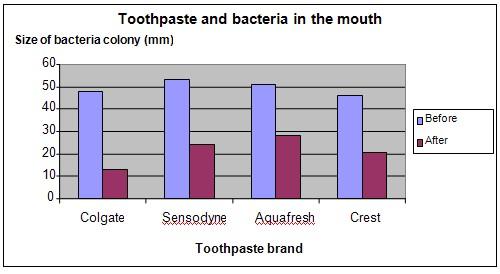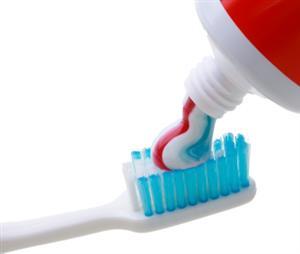| Complexity level: | 8 |
| Project cost ($): | 20 |
| Time required: | 1 hour to prepare, 4 days for science fair project |
| Material availability: | Easily found |
| Safety concerns: |
Hypothesis
The amount of bacteria in your mouth will be reduced after brushing your teeth with toothpaste.
Overview
Dental hygiene
There are plenty of bacteria and other micro-organisms living in our mouth. These bacteria attack the food leftovers that stick to, and in between our teeth. They cause our teeth to decay, forming plaque and causing bad breath. When they digest sugar and starch that stick to our teeth, they produce acids that will dissolve tooth enamel.
Brushing our teeth everyday with toothpaste is very important for dental hygiene. Using toothpaste together with the proper brushing techniques can help in getting rid of plaque and also remove bacteria so that gum disease and loss of teeth can be prevented. Some types of toothpaste are even able to prevent bacteria growth and plaque formation.
The most important ingredient in toothpaste is fluoride. It helps in strengthening the tooth surface and prevents bacteria growth. It also helps to repair tooth decay in the early stages. Another ingredient in toothpaste that helps in fighting bacteria is Triclosan, an antibacterial agent.
Scientific Terms
Materials
The materials required for this science fair project:
- 8 agar petri dishes prepared with agar
- 8 disinfected swabs
- 1 bottle of disinfected water
- 4 toothbrush
- 1 participant
- 1 cup and water
- 4 types of toothpaste – Colgate, Sensodyne, Aquafresh and Crest
- 1 marker pen
Eureka Crate — engineering & invention kits for ages 12+ — monthly projects that build real-world skills. (Affiliate link)
See what’s includedProcedure
1. For this science fair project, the independent variable is the brand of toothpaste used - Colgate, Sensodyne, Aquafresh and Crest. The dependent variable is the rate of bacteria growth in the petri dish. This is determined by measuring the size of the bacteria colony using a ruler. The constants (control variables) are method of brushing the teeth, the type of toothbrush used, the length of time for which the teeth is brushed, the room temperature, the amount of sunlight and the ingredients in the petri dish.
2. The 8 petri dishes that are prepared using agar are stored in a refrigerator. The petri dishes are brought to room temperature before the start of the experiment by taking them out of the refrigerator and allowing them to attain room temperature.
3. The science project will be conducted over 4 days using a different brand of toothpaste each day. The same type of toothbrush, for the same length of time and the same method of brushing the teeth will be used on all 4 days of testing.
4. On the first day of the experiment the Colgate toothpaste will be used by the participant. First, the participant is asked to rinse his mouth for 5 seconds and to then spit out the water. This is repeated 3 times.
5. The sterilized swab is first made damp using the sterilized water. The swab is rubbed over the front and back teeth of the participant and then rolled on the surface of the petri dish. The cover is closed and the petri dish is marked “Colgate –before”. The petri dish is kept in a cool shady place for the bacteria to colonize.
6. The participant will then brush his teeth using the Colgate toothpaste according to the requirement set out in procedure 3. After brushing his teeth, procedure 5 is repeated again and the petri dish will be marked “Colgate - after “.
7. Procedures 4, 5 and 6 are repeated on the second day using the Sensodyne toothpaste, on the third day using the Aquafresh toothpaste, and on the fourth day using the Crest toothpaste.
8. The diameter of the bacteria colony is measured after 5 days and recorded in the table below. .

Results
The results show that all the petri dishes with bacteria samples taken after brushing with toothpaste, had a smaller amount of bacteria growth. The petri dish with “Colgate – after” toothpaste had the smallest sized bacteria colony.
|
Condition |
Size of bacteria growth after 5 days (mm) |
|||
|
Colgate |
Sensodyne |
Aquafresh |
Crest |
|
|
Before brushing |
48 |
53 |
51 |
46 |
|
After brushing |
13 |
24 |
28 |
21 |
The chart below represents the results of our science project.

Conclusion
Our hypothesis, that the amount of bacteria in the mouth will be reduced after brushing one's teeth with toothpaste, is proven to be true.
Toothpaste and proper brushing techniques are important for dental hygiene and keeping our teeth strong and healthy. Toothpaste is used not only for killing bacteria and preventing tooth decay, but also for teeth whitening and preventing bad breath.
Also consider
This science fair project may be repeated, this time, with swab sample from different locations in the mouth like the tongue.
Modify the science project experiment, using different brands of mouthwash.
References
How does toothpaste clean your teeth? - http://www.ehow.com/about_4596423_toothpaste-clean-teeth.html
Toothpaste - http://www.dentalgentlecare.com/toothpaste.htm

